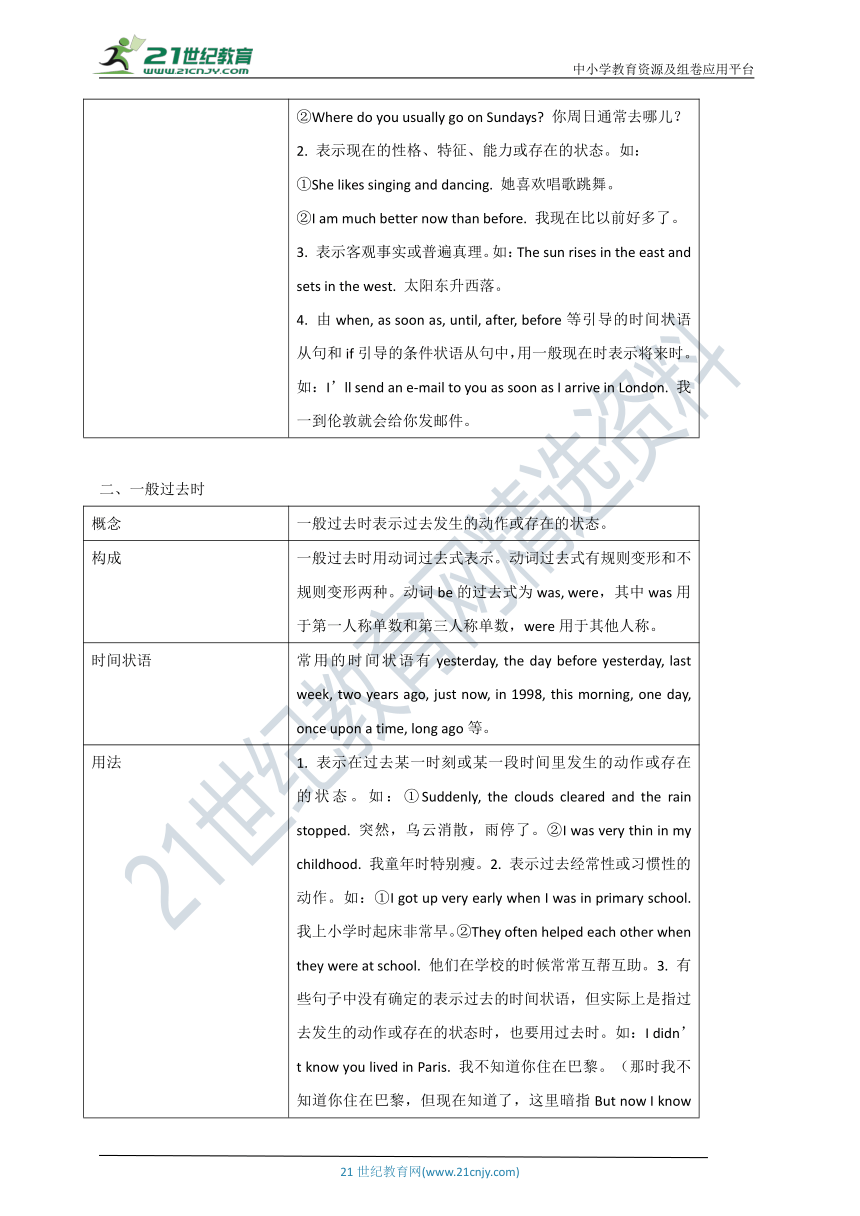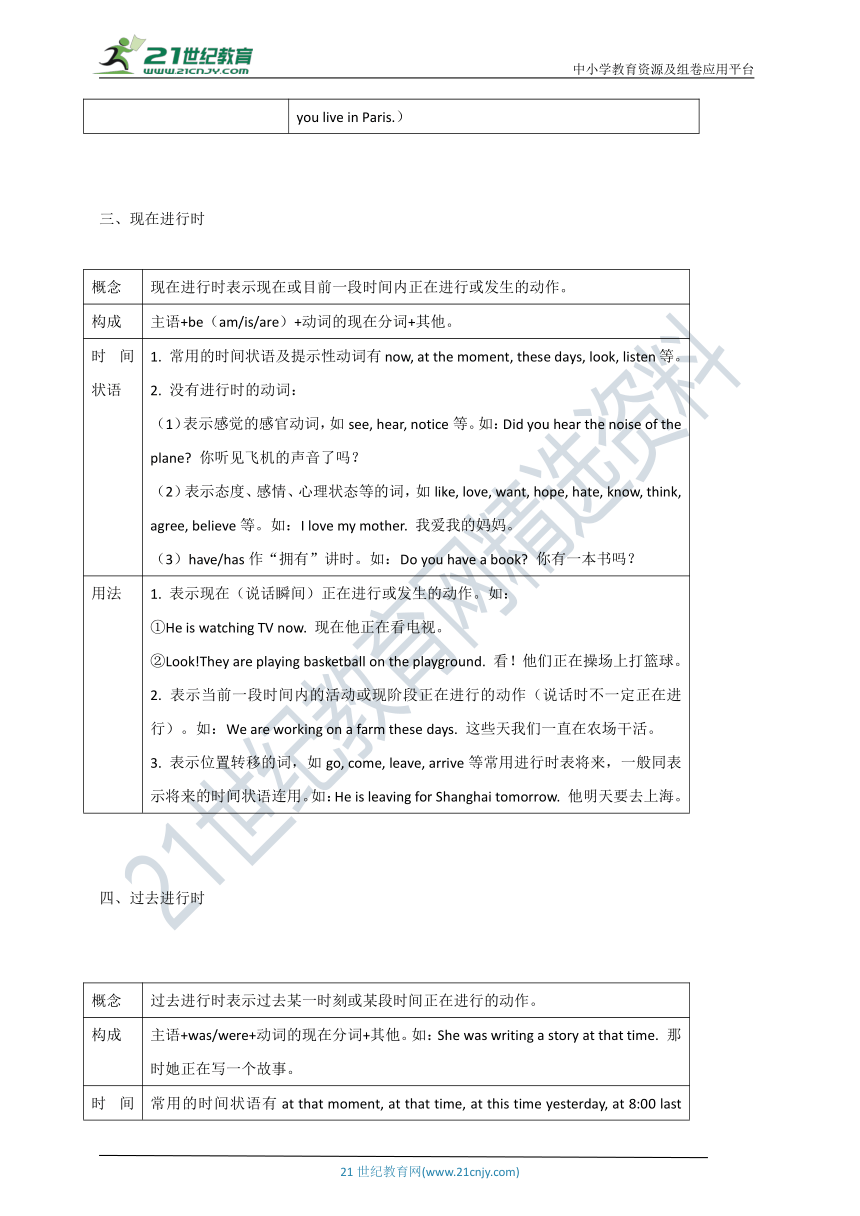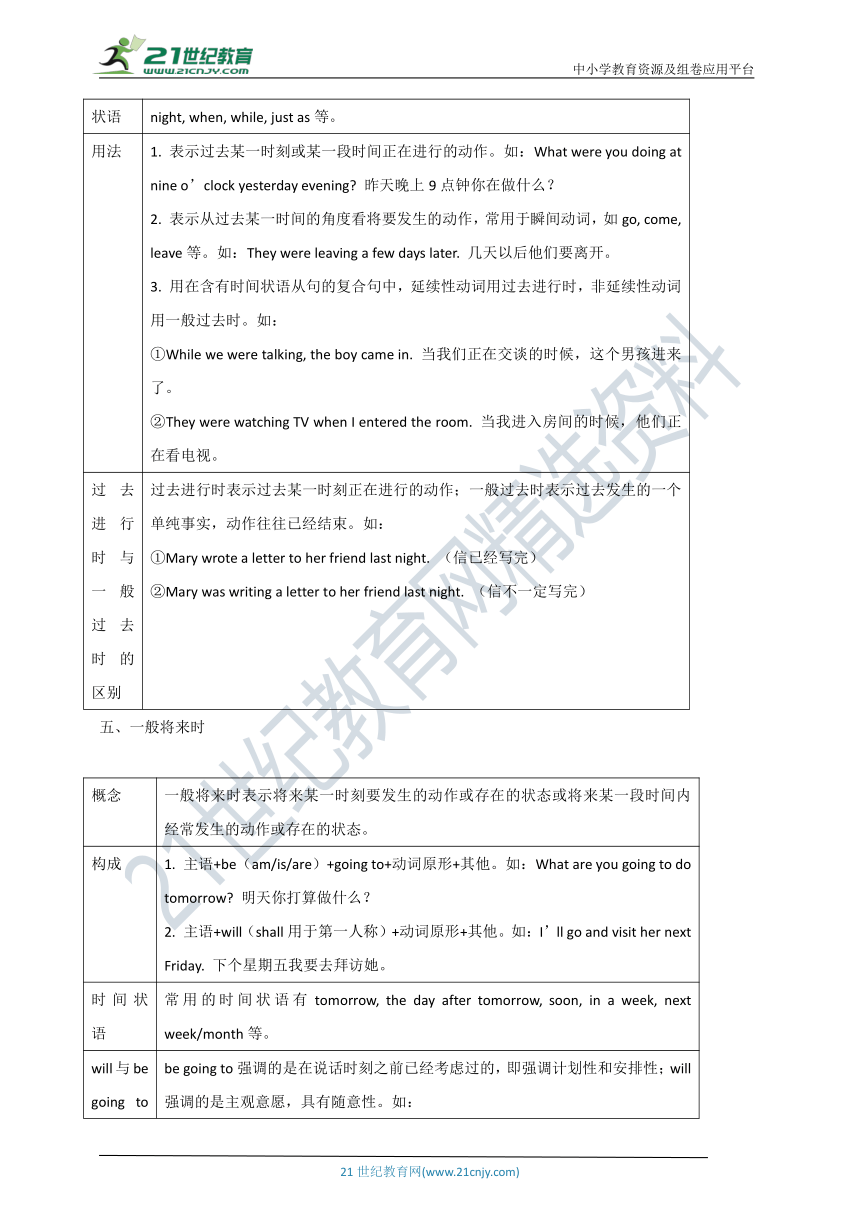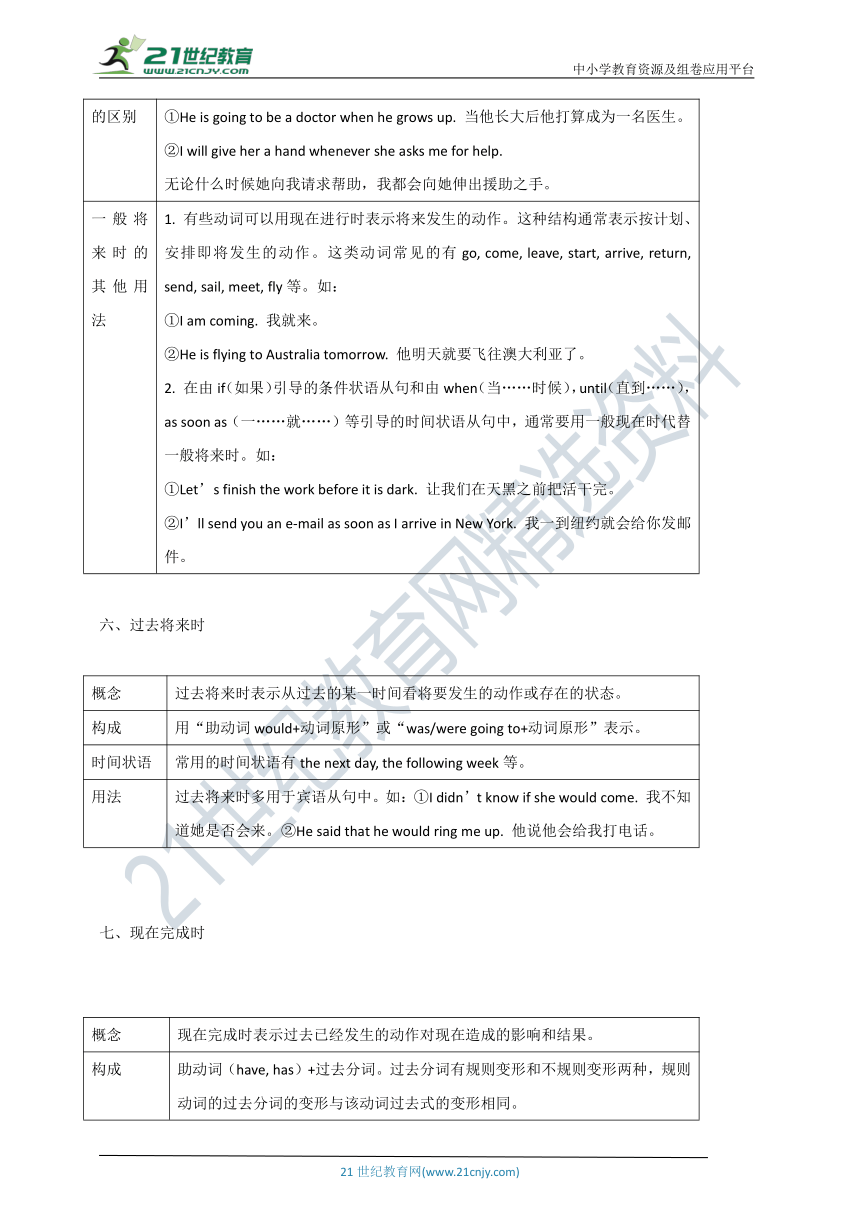外研版英语中考语法专项——动词的时态 知识梳理+实战演练(含答案)
文档属性
| 名称 | 外研版英语中考语法专项——动词的时态 知识梳理+实战演练(含答案) |

|
|
| 格式 | doc | ||
| 文件大小 | 1.5MB | ||
| 资源类型 | 试卷 | ||
| 版本资源 | 外研版 | ||
| 科目 | 英语 | ||
| 更新时间 | 2022-02-08 20:58:37 | ||
图片预览





文档简介
中小学教育资源及组卷应用平台
外研版英语中考语法专项
动词的时态
常见考点记忆导图
语法精讲
一、一般现在时
概念 一般现在时表示现阶段经常发生的动作或存在的状态。
构成 一般现在时用动词原形表示。第三人称单数作主语时,谓语动词用第三人称单数形式。be动词随主语人称、数的不同,有am, is, are三种形式的变化。
时间状语 常用的时间状语有often, usually, sometimes, always, hardly ever, seldom, never, at times, every day, once a week等,有时可以不使用。
用法 1. 表示现阶段经常性或习惯性的动作。如:①My uncle goes to Hainan Island once a week. 我叔叔一周去一次海南岛。②Where do you usually go on Sundays 你周日通常去哪儿?2. 表示现在的性格、特征、能力或存在的状态。如:①She likes singing and dancing. 她喜欢唱歌跳舞。②I am much better now than before. 我现在比以前好多了。3. 表示客观事实或普遍真理。如:The sun rises in the east and sets in the west. 太阳东升西落。4. 由when, as soon as, until, after, before等引导的时间状语从句和if引导的条件状语从句中,用一般现在时表示将来时。如:I’ll send an e-mail to you as soon as I arrive in London. 我一到伦敦就会给你发邮件。
二、一般过去时
概念 一般过去时表示过去发生的动作或存在的状态。
构成 一般过去时用动词过去式表示。动词过去式有规则变形和不规则变形两种。动词be的过去式为was, were,其中was用于第一人称单数和第三人称单数,were用于其他人称。
时间状语 常用的时间状语有yesterday, the day before yesterday, last week, two years ago, just now, in 1998, this morning, one day, once upon a time, long ago等。
用法 1. 表示在过去某一时刻或某一段时间里发生的动作或存在的状态。如:①Suddenly, the clouds cleared and the rain stopped. 突然,乌云消散,雨停了。②I was very thin in my childhood. 我童年时特别瘦。2. 表示过去经常性或习惯性的动作。如:①I got up very early when I was in primary school. 我上小学时起床非常早。②They often helped each other when they were at school. 他们在学校的时候常常互帮互助。3. 有些句子中没有确定的表示过去的时间状语,但实际上是指过去发生的动作或存在的状态时,也要用过去时。如:I didn’t know you lived in Paris. 我不知道你住在巴黎。(那时我不知道你住在巴黎,但现在知道了,这里暗指But now I know you live in Paris.)
三、现在进行时
概念 现在进行时表示现在或目前一段时间内正在进行或发生的动作。
构成 主语+be(am/is/are)+动词的现在分词+其他。
时间状语 1. 常用的时间状语及提示性动词有now, at the moment, these days, look, listen等。2. 没有进行时的动词:(1)表示感觉的感官动词,如see, hear, notice等。如:Did you hear the noise of the plane 你听见飞机的声音了吗?(2)表示态度、感情、心理状态等的词,如like, love, want, hope, hate, know, think, agree, believe等。如:I love my mother. 我爱我的妈妈。(3)have/has作“拥有”讲时。如:Do you have a book 你有一本书吗?
用法 1. 表示现在(说话瞬间)正在进行或发生的动作。如:①He is watching TV now. 现在他正在看电视。②Look!They are playing basketball on the playground. 看!他们正在操场上打篮球。2. 表示当前一段时间内的活动或现阶段正在进行的动作(说话时不一定正在进行)。如:We are working on a farm these days. 这些天我们一直在农场干活。3. 表示位置转移的词,如go, come, leave, arrive等常用进行时表将来,一般同表示将来的时间状语连用。如:He is leaving for Shanghai tomorrow. 他明天要去上海。
四、过去进行时
概念 过去进行时表示过去某一时刻或某段时间正在进行的动作。
构成 主语+was/were+动词的现在分词+其他。如:She was writing a story at that time. 那时她正在写一个故事。
时间状语 常用的时间状语有at that moment, at that time, at this time yesterday, at 8:00 last night, when, while, just as等。
用法 1. 表示过去某一时刻或某一段时间正在进行的动作。如:What were you doing at nine o’clock yesterday evening 昨天晚上9点钟你在做什么?2. 表示从过去某一时间的角度看将要发生的动作,常用于瞬间动词,如go, come, leave等。如:They were leaving a few days later. 几天以后他们要离开。3. 用在含有时间状语从句的复合句中,延续性动词用过去进行时,非延续性动词用一般过去时。如:①While we were talking, the boy came in. 当我们正在交谈的时候,这个男孩进来了。②They were watching TV when I entered the room. 当我进入房间的时候,他们正在看电视。
过去进行时与一般过去时的区别 过去进行时表示过去某一时刻正在进行的动作;一般过去时表示过去发生的一个单纯事实,动作往往已经结束。如:①Mary wrote a letter to her friend last night. (信已经写完)②Mary was writing a letter to her friend last night. (信不一定写完)
五、一般将来时
概念 一般将来时表示将来某一时刻要发生的动作或存在的状态或将来某一段时间内经常发生的动作或存在的状态。
构成 1. 主语+be(am/is/are)+going to+动词原形+其他。如:What are you going to do tomorrow 明天你打算做什么?2. 主语+will(shall用于第一人称)+动词原形+其他。如:I’ll go and visit her next Friday. 下个星期五我要去拜访她。
时间状语 常用的时间状语有tomorrow, the day after tomorrow, soon, in a week, next week/month等。
will与be going to的区别 be going to强调的是在说话时刻之前已经考虑过的,即强调计划性和安排性;will强调的是主观意愿,具有随意性。如:①He is going to be a doctor when he grows up. 当他长大后他打算成为一名医生。②I will give her a hand whenever she asks me for help. 无论什么时候她向我请求帮助,我都会向她伸出援助之手。
一般将来时的其他用法 1. 有些动词可以用现在进行时表示将来发生的动作。这种结构通常表示按计划、安排即将发生的动作。这类动词常见的有go, come, leave, start, arrive, return, send, sail, meet, fly等。如:①I am coming. 我就来。②He is flying to Australia tomorrow. 他明天就要飞往澳大利亚了。2. 在由if(如果)引导的条件状语从句和由when(当……时候),until(直到……),as soon as(一……就……)等引导的时间状语从句中,通常要用一般现在时代替一般将来时。如:①Let’s finish the work before it is dark. 让我们在天黑之前把活干完。②I’ll send you an e-mail as soon as I arrive in New York. 我一到纽约就会给你发邮件。
六、过去将来时
概念 过去将来时表示从过去的某一时间看将要发生的动作或存在的状态。
构成 用“助动词would+动词原形”或“was/were going to+动词原形”表示。
时间状语 常用的时间状语有the next day, the following week等。
用法 过去将来时多用于宾语从句中。如:①I didn’t know if she would come. 我不知道她是否会来。②He said that he would ring me up. 他说他会给我打电话。
七、现在完成时
概念 现在完成时表示过去已经发生的动作对现在造成的影响和结果。
构成 助动词(have, has)+过去分词。过去分词有规则变形和不规则变形两种,规则动词的过去分词的变形与该动词过去式的变形相同。
时间状语 常与already, just, yet, lately, recently, never, ever, once, twice, three times, before等连用。
用法 1. 表示结束、结果。动作发生在过去,而且终止于过去,但其结果对现在仍有影响。如:①I’ve written down some ideas. 我已经写下了一些想法。②I’ve just finished my homework. 我刚刚完成了我的作业。2. 表示继续。动作或状态从过去某一时刻开始,一直持续到现在,并有可能延续下去,要用延续性动词(否定句除外)。常与for和since引导的表示一段时间的状语连用(for+一段时间, since+时间开始的起点)。常用的时间状语还有in the last(past)..., for a long time, so far, ever since等。如:①I have studied at this school for two years. 我在这所学校上了两年学了。②Uncle Wang has worked in the factory since it opened. 自从这家工厂开办以来,王叔叔就在这儿工作。3. 表示经验,即从过去到现在之间曾经经历过的事情。如:I have never been to Mount Emei before. 我以前从未去过峨眉山。
注意事项 1. 现在完成时不能与表示过去的时间状语连用,如yesterday, last night, just now, last Sunday, in 1999, two weeks ago, when I arrived等;但可以和包括现在在内的一些时间状语连用,如today, this week, this month, this term, this year等。如:We have learned 500 English words this term. 我们这学期学了500个英语单词。2. 现在完成时的谓语动词如果是短暂性动词,通常不能与表示一段时间的for短语及since短语(或从句)等连用。应将短暂性动词改为相应的延续性动词。转换情况如下:borrow→keep, buy→have, die→be dead, come (to)→be (in), go/leave→be away, become→be, fall asleep→be asleep, begin→be on, go out→be out, join→be a member of, marry→be married。如:①He has been away since last week. 自从上周起他就不在这了。②How long have you kept the books 你借这些书多长时间了?注:在否定句中,短暂性动词可以和表示一段时间的状语连用。如:I haven’t borrowed a book for along time. 我好长时间没有借过一本书了。3. have/has been to与have/has gone to的区别:have/has been to表示“去过某地”,已经回来了或有去过某地的经历;have/has gone to表示“去某地了”,还没有回来。如:①Mary has been to Shanghai twice. 玛丽去过上海两次。(玛丽已不在上海了)②Mary has gone to Shanghai. 玛丽到上海去了。(玛丽已不在出发地了)
现在完成时与一般过去时的区别 侧重点不同。现在完成时是与现在有关的状态,属现在时态范畴,它侧重于过去的动作对现在造成的影响;而一般过去时是一种过去时态,侧重于表示过去的动作,与现在无关。如:①I closed the door five minutes ago. 我五分钟前关上了门。(强调动作发生在过去,现在门是否关上无从知晓)②I have closed the door. 我已经关上了门。(强调门现在是关着的)
八、过去完成时
构成 助动词had+动词的过去分词。
用法 1. 过去完成时表示在过去某一时间或动作之前已经发生或完成了的动作。它表示动作发生的时间是“过去的过去”。常与by, before, by the end of, by the time (that)等引导的时间状语从句连用。如:①She had known my brother for three years before I met her. 在我见到她以前,她认识我哥哥已经3年了。②By 10:30 she still hadn’t arrived. 到10:30时她还没到。③I found the letter after he had gone away. 他走了以后我找到了那封信。2. 过去完成时常用于宾语从句中。主句谓语为过去式(said, asked, told等),从句用过去完成时,此时从句中的动作发生在主句的动作之前。如:She said she had worked in a foreign company for five years before she became an English teacher. 她说在成为一名英语教师之前她已在一家外国公司工作了5年。
实战演练
一、用方框中所给动词的适当形式填空
give come find change put help
1. (温州中考)—Have scientists found life on Mars
—Not yet, but I think they______________ it some day.
2. (平阳模拟)—Mary, let’s go to the cinema. There’s a new movie called Avengers Ⅳ.
—Not now, I______________ my brother David with his math.
3. She______________ a lot in the past few years.
4. I’ll do it better if I______________ five more minutes.
5. She______________ on her coat and went out.
6. I didn’t know if Amy______________ .
二、用所给动词的适当形式填空
1. (温州市龙湾区模拟)—Tony, did you notice your dad come back
—No, I______________ (listen) to English in my bedroom.
2. —I can’t find Jack. Do you know where he is
—He______________ (go) to the museum with his son.
3. —Hi, Linda. I didn’t see you at the party last night.
—Oh, I______________ (get) ready for the math exam.
4. —Jane, where is Mike I can’t find him on the playground.
—Oh, he______________ (play) the piano in the music room now.
5. —Do you know if Cindy will drive to Italy this weekend
—Cindy Never. She______________ (hate) driving.
6. By the end of last week, she______________ (stay) in the west of China for two months helping the homeless children.
7. Mr. Wang has left for Guangzhou. He_____________(give) a speech there in two days.
8. While the lights______________ (change) to red, a car suddenly appeared round the corner.
9. If it______________ (rain) tomorrow, we won’t go swimming.
10. —My feelings for you have not changed.
—But you have changed. You are not as you______________(be).
参考答案
第31课 动词的时态
实战演练
一、1. will find 2. am helping 3. has changed 4. am given
5. put 6. would come
二、1. was listening 2. has gone 3. was getting 4. is playing
5. hates 6. had stayed 7. will give 8. were changing
9. rains 10. were
21世纪教育网 www.21cnjy.com 精品试卷·第 2 页 (共 2 页)
HYPERLINK "http://21世纪教育网(www.21cnjy.com)
" 21世纪教育网(www.21cnjy.com)
外研版英语中考语法专项
动词的时态
常见考点记忆导图
语法精讲
一、一般现在时
概念 一般现在时表示现阶段经常发生的动作或存在的状态。
构成 一般现在时用动词原形表示。第三人称单数作主语时,谓语动词用第三人称单数形式。be动词随主语人称、数的不同,有am, is, are三种形式的变化。
时间状语 常用的时间状语有often, usually, sometimes, always, hardly ever, seldom, never, at times, every day, once a week等,有时可以不使用。
用法 1. 表示现阶段经常性或习惯性的动作。如:①My uncle goes to Hainan Island once a week. 我叔叔一周去一次海南岛。②Where do you usually go on Sundays 你周日通常去哪儿?2. 表示现在的性格、特征、能力或存在的状态。如:①She likes singing and dancing. 她喜欢唱歌跳舞。②I am much better now than before. 我现在比以前好多了。3. 表示客观事实或普遍真理。如:The sun rises in the east and sets in the west. 太阳东升西落。4. 由when, as soon as, until, after, before等引导的时间状语从句和if引导的条件状语从句中,用一般现在时表示将来时。如:I’ll send an e-mail to you as soon as I arrive in London. 我一到伦敦就会给你发邮件。
二、一般过去时
概念 一般过去时表示过去发生的动作或存在的状态。
构成 一般过去时用动词过去式表示。动词过去式有规则变形和不规则变形两种。动词be的过去式为was, were,其中was用于第一人称单数和第三人称单数,were用于其他人称。
时间状语 常用的时间状语有yesterday, the day before yesterday, last week, two years ago, just now, in 1998, this morning, one day, once upon a time, long ago等。
用法 1. 表示在过去某一时刻或某一段时间里发生的动作或存在的状态。如:①Suddenly, the clouds cleared and the rain stopped. 突然,乌云消散,雨停了。②I was very thin in my childhood. 我童年时特别瘦。2. 表示过去经常性或习惯性的动作。如:①I got up very early when I was in primary school. 我上小学时起床非常早。②They often helped each other when they were at school. 他们在学校的时候常常互帮互助。3. 有些句子中没有确定的表示过去的时间状语,但实际上是指过去发生的动作或存在的状态时,也要用过去时。如:I didn’t know you lived in Paris. 我不知道你住在巴黎。(那时我不知道你住在巴黎,但现在知道了,这里暗指But now I know you live in Paris.)
三、现在进行时
概念 现在进行时表示现在或目前一段时间内正在进行或发生的动作。
构成 主语+be(am/is/are)+动词的现在分词+其他。
时间状语 1. 常用的时间状语及提示性动词有now, at the moment, these days, look, listen等。2. 没有进行时的动词:(1)表示感觉的感官动词,如see, hear, notice等。如:Did you hear the noise of the plane 你听见飞机的声音了吗?(2)表示态度、感情、心理状态等的词,如like, love, want, hope, hate, know, think, agree, believe等。如:I love my mother. 我爱我的妈妈。(3)have/has作“拥有”讲时。如:Do you have a book 你有一本书吗?
用法 1. 表示现在(说话瞬间)正在进行或发生的动作。如:①He is watching TV now. 现在他正在看电视。②Look!They are playing basketball on the playground. 看!他们正在操场上打篮球。2. 表示当前一段时间内的活动或现阶段正在进行的动作(说话时不一定正在进行)。如:We are working on a farm these days. 这些天我们一直在农场干活。3. 表示位置转移的词,如go, come, leave, arrive等常用进行时表将来,一般同表示将来的时间状语连用。如:He is leaving for Shanghai tomorrow. 他明天要去上海。
四、过去进行时
概念 过去进行时表示过去某一时刻或某段时间正在进行的动作。
构成 主语+was/were+动词的现在分词+其他。如:She was writing a story at that time. 那时她正在写一个故事。
时间状语 常用的时间状语有at that moment, at that time, at this time yesterday, at 8:00 last night, when, while, just as等。
用法 1. 表示过去某一时刻或某一段时间正在进行的动作。如:What were you doing at nine o’clock yesterday evening 昨天晚上9点钟你在做什么?2. 表示从过去某一时间的角度看将要发生的动作,常用于瞬间动词,如go, come, leave等。如:They were leaving a few days later. 几天以后他们要离开。3. 用在含有时间状语从句的复合句中,延续性动词用过去进行时,非延续性动词用一般过去时。如:①While we were talking, the boy came in. 当我们正在交谈的时候,这个男孩进来了。②They were watching TV when I entered the room. 当我进入房间的时候,他们正在看电视。
过去进行时与一般过去时的区别 过去进行时表示过去某一时刻正在进行的动作;一般过去时表示过去发生的一个单纯事实,动作往往已经结束。如:①Mary wrote a letter to her friend last night. (信已经写完)②Mary was writing a letter to her friend last night. (信不一定写完)
五、一般将来时
概念 一般将来时表示将来某一时刻要发生的动作或存在的状态或将来某一段时间内经常发生的动作或存在的状态。
构成 1. 主语+be(am/is/are)+going to+动词原形+其他。如:What are you going to do tomorrow 明天你打算做什么?2. 主语+will(shall用于第一人称)+动词原形+其他。如:I’ll go and visit her next Friday. 下个星期五我要去拜访她。
时间状语 常用的时间状语有tomorrow, the day after tomorrow, soon, in a week, next week/month等。
will与be going to的区别 be going to强调的是在说话时刻之前已经考虑过的,即强调计划性和安排性;will强调的是主观意愿,具有随意性。如:①He is going to be a doctor when he grows up. 当他长大后他打算成为一名医生。②I will give her a hand whenever she asks me for help. 无论什么时候她向我请求帮助,我都会向她伸出援助之手。
一般将来时的其他用法 1. 有些动词可以用现在进行时表示将来发生的动作。这种结构通常表示按计划、安排即将发生的动作。这类动词常见的有go, come, leave, start, arrive, return, send, sail, meet, fly等。如:①I am coming. 我就来。②He is flying to Australia tomorrow. 他明天就要飞往澳大利亚了。2. 在由if(如果)引导的条件状语从句和由when(当……时候),until(直到……),as soon as(一……就……)等引导的时间状语从句中,通常要用一般现在时代替一般将来时。如:①Let’s finish the work before it is dark. 让我们在天黑之前把活干完。②I’ll send you an e-mail as soon as I arrive in New York. 我一到纽约就会给你发邮件。
六、过去将来时
概念 过去将来时表示从过去的某一时间看将要发生的动作或存在的状态。
构成 用“助动词would+动词原形”或“was/were going to+动词原形”表示。
时间状语 常用的时间状语有the next day, the following week等。
用法 过去将来时多用于宾语从句中。如:①I didn’t know if she would come. 我不知道她是否会来。②He said that he would ring me up. 他说他会给我打电话。
七、现在完成时
概念 现在完成时表示过去已经发生的动作对现在造成的影响和结果。
构成 助动词(have, has)+过去分词。过去分词有规则变形和不规则变形两种,规则动词的过去分词的变形与该动词过去式的变形相同。
时间状语 常与already, just, yet, lately, recently, never, ever, once, twice, three times, before等连用。
用法 1. 表示结束、结果。动作发生在过去,而且终止于过去,但其结果对现在仍有影响。如:①I’ve written down some ideas. 我已经写下了一些想法。②I’ve just finished my homework. 我刚刚完成了我的作业。2. 表示继续。动作或状态从过去某一时刻开始,一直持续到现在,并有可能延续下去,要用延续性动词(否定句除外)。常与for和since引导的表示一段时间的状语连用(for+一段时间, since+时间开始的起点)。常用的时间状语还有in the last(past)..., for a long time, so far, ever since等。如:①I have studied at this school for two years. 我在这所学校上了两年学了。②Uncle Wang has worked in the factory since it opened. 自从这家工厂开办以来,王叔叔就在这儿工作。3. 表示经验,即从过去到现在之间曾经经历过的事情。如:I have never been to Mount Emei before. 我以前从未去过峨眉山。
注意事项 1. 现在完成时不能与表示过去的时间状语连用,如yesterday, last night, just now, last Sunday, in 1999, two weeks ago, when I arrived等;但可以和包括现在在内的一些时间状语连用,如today, this week, this month, this term, this year等。如:We have learned 500 English words this term. 我们这学期学了500个英语单词。2. 现在完成时的谓语动词如果是短暂性动词,通常不能与表示一段时间的for短语及since短语(或从句)等连用。应将短暂性动词改为相应的延续性动词。转换情况如下:borrow→keep, buy→have, die→be dead, come (to)→be (in), go/leave→be away, become→be, fall asleep→be asleep, begin→be on, go out→be out, join→be a member of, marry→be married。如:①He has been away since last week. 自从上周起他就不在这了。②How long have you kept the books 你借这些书多长时间了?注:在否定句中,短暂性动词可以和表示一段时间的状语连用。如:I haven’t borrowed a book for along time. 我好长时间没有借过一本书了。3. have/has been to与have/has gone to的区别:have/has been to表示“去过某地”,已经回来了或有去过某地的经历;have/has gone to表示“去某地了”,还没有回来。如:①Mary has been to Shanghai twice. 玛丽去过上海两次。(玛丽已不在上海了)②Mary has gone to Shanghai. 玛丽到上海去了。(玛丽已不在出发地了)
现在完成时与一般过去时的区别 侧重点不同。现在完成时是与现在有关的状态,属现在时态范畴,它侧重于过去的动作对现在造成的影响;而一般过去时是一种过去时态,侧重于表示过去的动作,与现在无关。如:①I closed the door five minutes ago. 我五分钟前关上了门。(强调动作发生在过去,现在门是否关上无从知晓)②I have closed the door. 我已经关上了门。(强调门现在是关着的)
八、过去完成时
构成 助动词had+动词的过去分词。
用法 1. 过去完成时表示在过去某一时间或动作之前已经发生或完成了的动作。它表示动作发生的时间是“过去的过去”。常与by, before, by the end of, by the time (that)等引导的时间状语从句连用。如:①She had known my brother for three years before I met her. 在我见到她以前,她认识我哥哥已经3年了。②By 10:30 she still hadn’t arrived. 到10:30时她还没到。③I found the letter after he had gone away. 他走了以后我找到了那封信。2. 过去完成时常用于宾语从句中。主句谓语为过去式(said, asked, told等),从句用过去完成时,此时从句中的动作发生在主句的动作之前。如:She said she had worked in a foreign company for five years before she became an English teacher. 她说在成为一名英语教师之前她已在一家外国公司工作了5年。
实战演练
一、用方框中所给动词的适当形式填空
give come find change put help
1. (温州中考)—Have scientists found life on Mars
—Not yet, but I think they______________ it some day.
2. (平阳模拟)—Mary, let’s go to the cinema. There’s a new movie called Avengers Ⅳ.
—Not now, I______________ my brother David with his math.
3. She______________ a lot in the past few years.
4. I’ll do it better if I______________ five more minutes.
5. She______________ on her coat and went out.
6. I didn’t know if Amy______________ .
二、用所给动词的适当形式填空
1. (温州市龙湾区模拟)—Tony, did you notice your dad come back
—No, I______________ (listen) to English in my bedroom.
2. —I can’t find Jack. Do you know where he is
—He______________ (go) to the museum with his son.
3. —Hi, Linda. I didn’t see you at the party last night.
—Oh, I______________ (get) ready for the math exam.
4. —Jane, where is Mike I can’t find him on the playground.
—Oh, he______________ (play) the piano in the music room now.
5. —Do you know if Cindy will drive to Italy this weekend
—Cindy Never. She______________ (hate) driving.
6. By the end of last week, she______________ (stay) in the west of China for two months helping the homeless children.
7. Mr. Wang has left for Guangzhou. He_____________(give) a speech there in two days.
8. While the lights______________ (change) to red, a car suddenly appeared round the corner.
9. If it______________ (rain) tomorrow, we won’t go swimming.
10. —My feelings for you have not changed.
—But you have changed. You are not as you______________(be).
参考答案
第31课 动词的时态
实战演练
一、1. will find 2. am helping 3. has changed 4. am given
5. put 6. would come
二、1. was listening 2. has gone 3. was getting 4. is playing
5. hates 6. had stayed 7. will give 8. were changing
9. rains 10. were
21世纪教育网 www.21cnjy.com 精品试卷·第 2 页 (共 2 页)
HYPERLINK "http://21世纪教育网(www.21cnjy.com)
" 21世纪教育网(www.21cnjy.com)
同课章节目录
- 词法
- 名词
- 动词和动词短语
- 动词语态
- 动词时态
- 助动词和情态动词
- 非谓语动词
- 冠词
- 代词
- 数词和量词
- 形容词副词及其比较等级
- 介词和介词短语
- 连词和感叹词
- 构词法
- 相似、相近词比较
- 句法
- 陈述句
- 一般疑问句和否定疑问句
- 特殊疑问句及选择疑问句
- 反意疑问句
- 存在句(There be句型)
- 宾语从句
- 定语从句
- 状语从句
- 主谓一致问题
- 简单句
- 并列句
- 复合句
- 主谓一致
- 主、表语从句
- 名词性从句
- 直接引语和间接引语
- 虚拟语气
- 感叹句
- 强调句
- 倒装句
- 祈使句
- 句子的成分
- 句子的分类
- 题型专区
- 单项选择部分
- 易错题
- 完形填空
- 阅读理解
- 词汇练习
- 听说训练
- 句型转换
- 补全对话
- 短文改错
- 翻译
- 书面表达
- 任务型阅读
- 语法填空
- 其他资料
